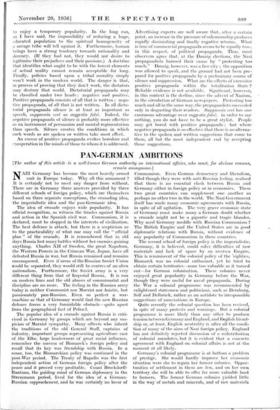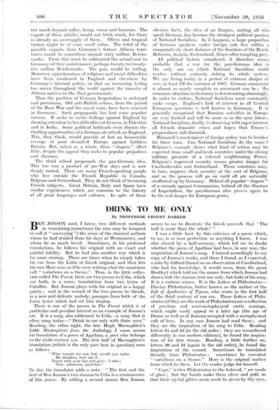PAN-GERMAN AMBITIONS
[The author of this article is a well-known German authority on international affairs, who must, for obvious reasons, remain anonymous.] defence forces a very formidable obstacle—quite apart Quite recently the colonial question has been revived, The popular idea of a crusade against Russia is criti- programme is more likely than any other to produce cised in Germany by groups which are beyond any sus- tension between Germany and England, and English friend- picion of Marxist sympathy. Many officers who inherit ship or, at least, English neutrality is after all the condi- the traditions of the old General Staff, captains of tion of many of the aims of Nazi foreign policy. England industry, important groups representing agriculture east has not definitely rejected discussion of a redistribution of the Elbe, large landowners of great social influence, of colonial mandates, but it is evident that a concrete remember the success of Bismarck's foreign policy and agreement with England on colonial affairs is not at the recall that its key was friendship with Russia. In a moment at all likely.
sense, too, the Bismarckian policy was continued in the Germany's colonial programme is at bottom a problem post-War period. The Treaty of Rapallo was the first of prestige. She would hardly improve her, economic independent action of German foreign policy after the situation were she to regain her former colonies. Oppor- peace and it proved very profitable. Count Brockdorff- tunities of settlement in them are few, and on her own Rantzau, the guiding mind of German diplomacy in the territory she will be able to offer far more valuable land Stresemann period, lived for the idea of a German- to farmers. The former German colonies yielded little Russian rapprochement, and he was certainly no lover of in the way of metals and minerals, and of raw materials There are in Germany three answers provided by three Germany either in foreign policy or in economics. These different schools of foreign policy, which are themselves two great countries can supplement one another as based on three separate conceptions, the crusading idea, perhaps no other two in the world. The Nazi Government the imperialistic idea and the pan-Germanic idea, itself has made many economic agreements with Russia, The idea of crusade enjoys wide popularity. It has in spite of all agitation. The very grave economic state official recognition, as witness the tirades against Russia of Germany must make many a German doubt whether and action in the Spanish civil war. Communism, it is a crusade might not be a gigantic and tragic blunder. declared, must be stopped in the interests of civilisation. Why need Germany meddle with Russian Communism ? The best defence is attack, but there is a scepticism as _ The British Empire' and the United States arc in good to the practicability of what one may call the " official diplomatic relations with Russia, without evidence of plan " of the crusade. It is remembered that in old any popularity of Communism in these countries.
days Russia lost many battles without her enemies gaining The second school of foreign policy is the imperialistic. anything. Charles XII of Sweden, the great Napoleon, Germany, it is believed, could solve difficulties of raw the Western Powers in the Crimean War, Japan, have all materials and lack of space by an oversee Empire. defeated Russia in war, but Russia remained and remains This is reminiscent of the colonial policy of the 'eighties. unconquered. Even if areas of the Russian Soviet Union Bismarck was no colonial enthusiast, yet he tried to could be separated, they would still be centres of an alien obtain certain territories—none too valuable as it turned nationalism. Furthermore, the Soviet army is a very out—for German colonisation. These colonies never different thing from that of Imperial Russia. It is run enjoyed great popularity in Germany before the War, on modern lines and the old abuses of commissariat and though they were useful for naval propaganda. During discipline are no more. The feeling in the Russian army the War' a colonial programme was recommended by today is neither Communist nor Marxist nor Asiatic, but enlightened statesmen and politicians, such as Dcrnburg, passionately pan-Russian. Even so perfect a war- Solf and Delbrfick, rather as an antidote to irresponsible machine as that of Germany would find the new Russian suggestions of annexations in Europe.
from the geographical fact of Poland. in spite of many protests and warnings. But a colonial not much beyond coffee, hemp, cocoa and bananas. The export of these articles would not fetch much, for there is already an oversupply of them. Olives and tropical timber might be of some small value. The total of the possible exports from Germany's former African terri- tories would be somewhere around sixty million Reichs- marks. From this must be subtracted the actual cost to Germany of their maintenance, perhaps twenty to twenty- five million Reichsmarks. The gain would be trifling. Moreover, apprehensions of religious and racial difficulties have been awakened in England and elsewhere by Germany's internal policy, so that an increasing feeling has arisen throughout the world against the transfer of African natives to the Nazi government.
Thus the position of German Imperialism is awkward and precarious. Old anti-British echoes, from the period of the Boer War and the naval scare, have been renewed in Germany. Such propaganda has had some popular success. It seeks to excite feelings against England by drawing attention to her difficulties at Geneva, in Palestine and in India. Some political hotheads even discuss the thrilling opportunities of a German air attack on England. This, they think, would provide at last an honourable revenge of poor disunited Europe against faithless Britain. But, taken as a whole, these " slogans " effect little, despite the appeal they make to popular prejudices and illusions.
The third school propounds the pan-German idea. This too was a product of pre-War days and is now deeply rooted. There are many French-speaking people who live outside the French Republic—in Canada, Belgium and Switzerland. They do not think of becoming French subjects. Great Britain, Italy and Spain have similar experiences, which are common to the history of all great languages and cultures. In spite of these obvious facts, the idea of an Empire, uniting all who speak German, has become the strongest political passion of National Socialism. As it happens, a large proportion of German speakers under foreign rule live within a comparatively short distance of the frontiers of the Reich. Bohemia, Austria, Switzerland, Alsace offer tempting prey.
All political factors considered, it therefore- seems probable that a war for the pan-German idea is the only one on which National Socialism could resolve Without seriously risking its ' whole system. We arc living today in a period of extreme danger of War, at least till the autumn of 1937. German armament is almost as nearly . complete as armament can be; the economic situation in Germany is deteriorating alarmingly. In order to endure, NatiOnal Socialism must - constantly make coups. England's lack . of .interest in all • Central European questions is well known in GerMany. It is generally recOgniied that Russian activities in Europe are very limited and will be more So 'in the near future. NationalSoeialism, finally, is observing with eager interest all French domestic crises and holies that France's preparedness will diMinish.
Bismarck's masterpiece of foreign policy was to localise his three wars. Can National Socialism do the same ? Belgium's. example 'shows what kind of action May be expected from small and weak countries under the strong military pressure of a colossal neighbouring Power. Belgium's improved security means greater danger for Czechoslovakia and Switierland. - Those countries may, in turn, improve their security at the cost of Belgium, . and so the proeess will go on until all are naturally swallowed up by Germany. Behind all popular " slogans " of a crusade against Communism, behind all the illusions of Imperialism, the pan-German idea proves again to be the real danger for European peace. ' •





























































 Previous page
Previous page